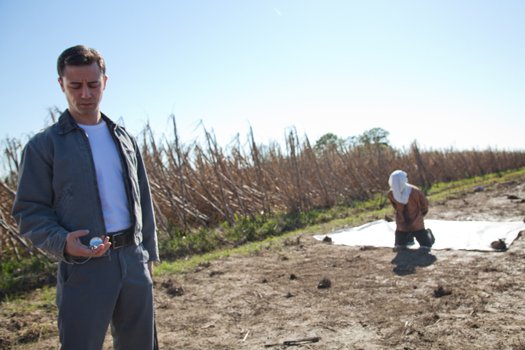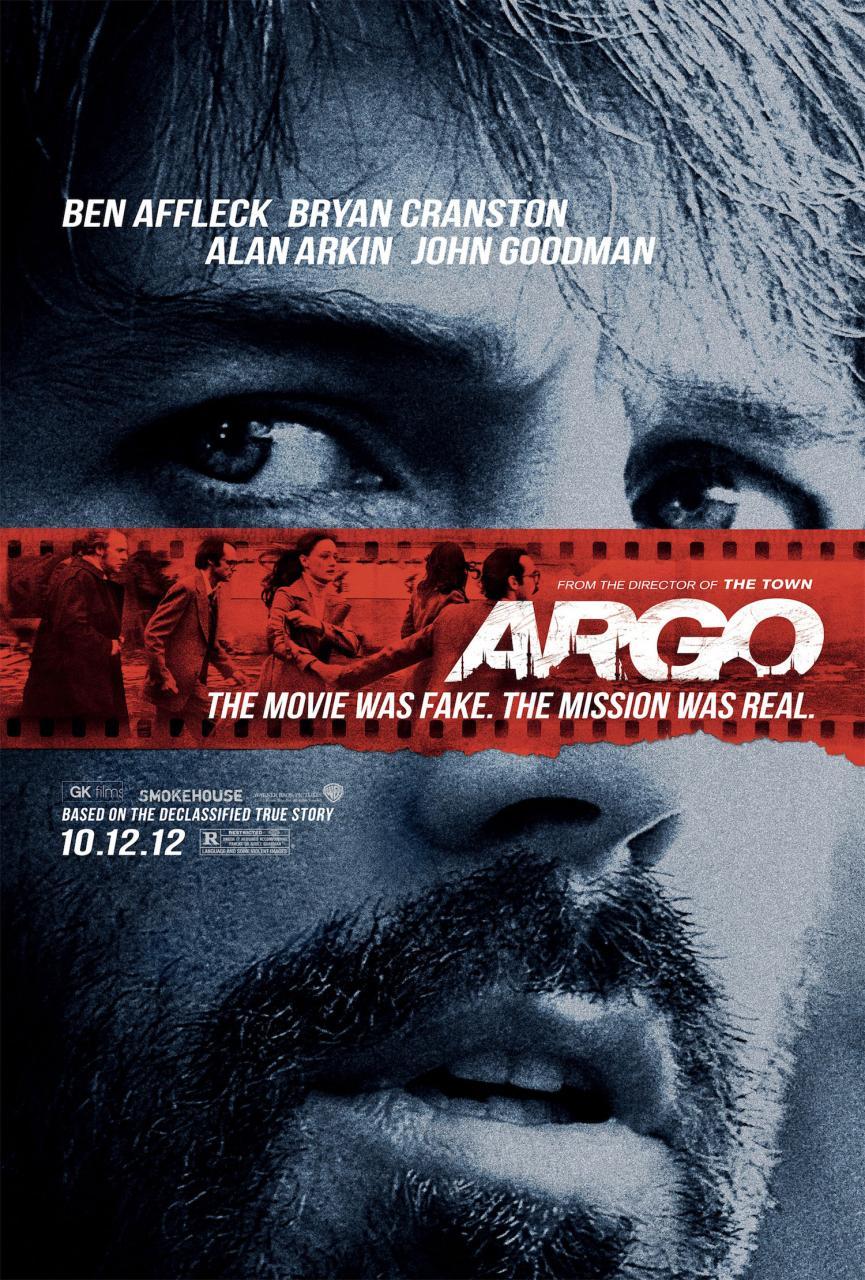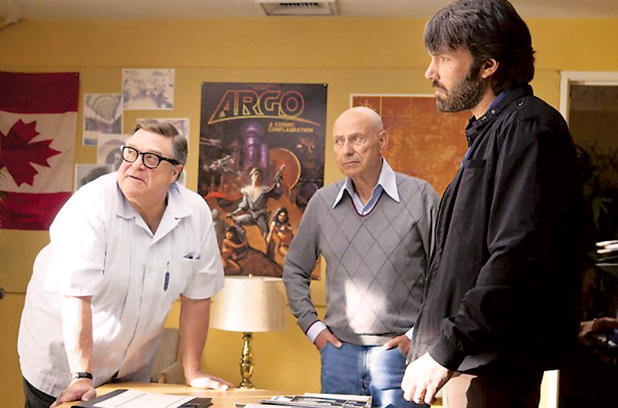

Director:
Rian Johnson, 2012 (R)
If you could go back in time and assassinate Adolf Hitler to prevent WW2 and the resulting Holocaust, would you? Despite the paradoxes that it might bring, would this murder be ethically acceptable? This is more or less one of the ethical questions that Looper raises. Though it doesn’t really give us an answer, it does cause us to think deeply, particularly about the paradoxes that emerge from careful consideration.
As a time travel movie,
Looper has many twists and turns, and it would be wrong to share any that would reveal too much of the plot. So I will do my best to make this, as much as possible, spoiler-free.
This intense, exciting and somewhat violent film is set in a future Kansas City, somewhere around 2044. The main character Joe (Joseph Gordon-Levitt,
Inception), sets the scene at the very start: “Time travel has not yet been invented. But thirty years from now, it will have been.” Joe goes on to explain his job, and how it is impacted by time travel: “I work as a specialized assassin, in an outfit called the Loopers. When my organization from the future wants someone to die, they zap them back to me and I eliminate the target from the future. The only rule is: never let your target escape . . . even if your target is you.”
Joe is nothing other than a mob hit-man. In that future year of 2074, implanted trackers make disposing of a body impossible, so sending it back to the past from the future takes care of two problems: no corpse left in the future, and no in the past is aware of the murder except the looper, who doesn’t know the identity of the victim. The looper waits for the hit to appear out of thin air, masked and trussed up. He shoots the victim with a “blunderbuss,” a huge shotgun of sorts, and then collects the ingots of silver taped to the victim’s back. It’s foolproof, at least until someone in the future, known enigmatically as “the Rainman,” starts sending the loopers themselves back to be killed by their younger selves. This is known as “closing the loop.” The looper knows he has killed his older self because the silver is replaced by gold, his final payout. A pension of sorts, the looper is retired from his job to live out the next 30 years in luxury until the Rainmaker’s men come to capture him and send him back to his destiny.

Writer-director Johnson does a fabulous job with the film. He has shown his abilities before in the con-flick
The Brothers Bloom, and here takes the time travel subgenre of sci-fi and subverts it, giving us a real thrill ride. Unlike other films of this ilk, such as
Source Code or
In Time, Johnson takes time to develop character as well as plot. It is not superficial. It all plays together. Drawing from earlier sci-fi films like
Blade Runner, the future displays a bleak dystopia of disintegration and decay, and of division between the haves and the have-nots. Vagrant districts exist alongside urban nightclubs, where the clubbers are willing to run-down the vagabonds without care. And the clubbers live for dancing, drink and drugs, the latter taken via eye drops.
Yet alongside this urban squalor, the countryside appears expansive, looking hardly different from today. Apart from a few robotic enablers, farmers like Sara (Emily Blunt,
Salmon Fishing in the Yemen) work in the fields manually.
The first act of the film takes time to explain the set-up, introducing us to Joe, the young looper. He drops drugs, visits prostitutes, and kills people. His life is aimless, but he seems to want more, to be a better person. His friend Seth (Paul Dano,
There Will be Blood) is the first to let his older self run. And we see the consequences imposed by Abe (Jeff Daniels,
Traitor), the criminal who runs Kansas City, himself a traveller from the future. Johnson cleverly and graphically depicts the impact of two versions of one person being in the same time and city, but it brings paradoxes about multiverses and single timelines to mind.
Seth’s situation leads us into act two, where Joe’s older self, played by Bruce Willis, is sent back to die but escapes. He has come back on a mission: to find and kill the young Rainmaker. Like Hitler, the Rainmaker will grow up to desire, and indeed exercise, global control via a vast criminal organization. Old Joe has a vested interest in carrying out the deed, so for him it is not so much altruistic as self-seeking.

There are two standout scenes. The first is the best diner/restaurant scene since Pacino sat across from De Nero in
Heat. Here young Joe meets old Joe in their favorite diner. Sitting across from one other, the old sees the young as naïve and full of crap. The young Joe sees the old as a has-been, one whose time has passed, who should be killed. Both share memories, but neither respects the other, though they are the same person. Talk about mind-blowing.
The second scene raises the first ethical issue. Young Joe is driving his sports car from the club with other loopers, drugged out with drops. As he turns a corner he has to slam on the brakes to stop from hitting and killing a young vagrant kid. Looking him in the eye, Joe sees himself, a younger version, lost and abandoned. He was sold into slavery by his mother, and escaped into a life of vagrancy and crime.
Lost boys permeate the script. Abandonment is a sub-theme. What does it mean to be lost? The dictionary defines it as “having gone astray or missed the way” or “no longer possessed or retained.” This parallels the biblical concept of lostness. Jesus gives three key parables about lostness in Luke 15, culminating in the parable of the lost (also known as the prodigal) son. Like the prodigal son, we have all gone astray (Isa. 53:6), each of us has turned to his own way, and we find ourselves lost. We are lost in actual sense of not knowing where we are. And we are lost in the sense of no longer being possessed or in relationship to our creator. We find ourselves abandoned, separated from the God who formed us, now living as vagabonds. Only when he reaches down through Christ are we brought into the family of God (Jn. 1:12). In the words of the hymnist John Newton, “I once was lost but now am found.”
With two versions of Joe on the loose, both being chased by Abe, each has a different mission. Old Joe wants to find and kill the Rainmaker. Young Joe finds himself on Sara’s farm and wants to protect her and her young son Cid (Pierce Gagnon). And these opposing missions collide in the third and final act in the middle of the Kansas corn fields.

The cast delivers strong acting. Gordon-Levitt, with the help of old fashioned prosthetics, looks remarkably like a young Bruce Willis. Willis plays the cynical old man to a tee, even giving us a glimpse of his
Die Hard persona. Blunt shows she can pull off an American accent and handle a shotgun as a realistic farmer. But it is the young Gagnon who stands out. He plays off Gordon-Levitt perfectly. One scene has Gagnon staring with malevolent eyes and we see lostness and abandonment personified, if for a brief instant.
A key theme throughout, and a strong ethical question, is nature vs nurture. Although the film does not offer an answer, it poses the question of whether we are made the way we are or we become that way through our upbringing and choices. In other words, how do our choices today impact our character and self tomorrow?
The Bible addresses this concept. Many people ask, are evil people (like Hitler) born evil? The Psalmist David declares, “Surely I was sinful at birth,
sinful from the time my mother conceived me” (Psa. 51:5). Although we would not necessarily equate evil with sin, evil begins with sin. And we are all sinful (Rom. 3:9), and so all have the capacity for evil. Does that mean nurture has no effect due to our inherent sinful nature (Rom. 7:5)? Not at all. Our upbringing does form us. Our nurture influences us. Certainly most of us refuse to let sin run rampant and thus don’t become the next Stalin or Rainmaker. But unchecked, the sinful nature can make monsters out of men. And though these are one in a million, their very existence points to the potential of evil. To put it differently, nature is primary, but nurture has a secondary effect.

And that brings us back to the primary ethical question: is it wrong to try to kill a potential monster, a latent terrorist? Before we jump to a conclusion, we should ponder current global events. According to the
Tribune St Louis Obispo earlier this year, the US Attorney General Eric Holder said the government was justified in killing a US citizen who posed a potential terrorist threat. And with the new Stanford/NYU study on deaths due to US drones in Pakistan, reported in the UK newspaper
The Guardian, this ethical question has immediate relevance. Of course, time-travel apart, the practice of killing potential enemies is nothing new. New kings in Bible times would kill other relatives or contemporaries to remove competitors to the throne (e.g., Athaliah’s actions of destroying the whole royal family in 2 Kings 11:1). Further, King Herod had all the boys two years old or younger in the vicinity of Bethlehem killed to try to eradicate the predicted king, the young Jesus (Matt. 2:16-18). Having considered all this, Jesus would answer yes to our earlier question. He would seek a peaceful solution. He stared the monster in the eye, both in the desert (when he faced the devil; Lk. 4:1-13) and in the palace (Jn 19), and took no action. He would not kill the monster, and neither should we. Instead, Jesus took a different kind of action: sacrifice.
Indeed, sacrifice is the final theme in this provocative movie. Early in the film, Abe questions Joe, “Ask yourself, who would I sacrifice for what’s mine?” He is pointing to other-sacrifice, i.e., betrayal or murder. But that is no sacrifice. Later, Joe reflects: “Then I saw it. A mother who would die for her son, a man who would kill for his wife, and an abandoned child headed the wrong path.” Here is self-sacrifice.
Looper points to self-sacrifice as an answer to killing of potential terrorists. But the true answer comes from Jesus’ self-sacrifice. The son of God, the third person of the Trinity, the creator of all that exists, chose to sacrifice himself to deal with the issue of evil and sin. He willingly allowed himself to be led, like a sheep, to the slaughter (Isa. 53:7). He let himself be nailed to a cross, to hang there till he gave up his life. And he did this for the lost boys, the abandoned men and women of this world. He did it for you and me.
We might not go back in time to kill a young Hitler. But we can look back in time to the death of Jesus. And looking back, we can see the sacrifice that allows us be found. We see the death that gives us life. And when we place our trust in Jesus, choosing to follow him in this life, we find our loop closed . . . but in the positive sense. We die to ourselves, and find we are living for Christ (Gal. 2:20).
Copyright ©2012, Martin Baggs
 My wife and I are planning to go see Lincoln this Friday 11/30/12 for the 5:30pm screening at the Moreland Theater in Sellwood. For this screening tickets are just $5. We are also planning to get a beer and a burger afterwards in the neighborhood either at the Laurelwood Pub or the Oaks Bottom Pub. We are extending an invitation to the group for anyone interested to join us of the movie and/or the meal afterwards. No guarantees that we'll get a table for everyone but we can always break into smaller groups if numbers get too large.
My wife and I are planning to go see Lincoln this Friday 11/30/12 for the 5:30pm screening at the Moreland Theater in Sellwood. For this screening tickets are just $5. We are also planning to get a beer and a burger afterwards in the neighborhood either at the Laurelwood Pub or the Oaks Bottom Pub. We are extending an invitation to the group for anyone interested to join us of the movie and/or the meal afterwards. No guarantees that we'll get a table for everyone but we can always break into smaller groups if numbers get too large.













 One interchange between Evelyn, our protagonist and Muriel, gets to the heart of this. Evelyn says, “Nothing here has worked out quite as I expected.” Muriel insightfully replies, “Most things don’t. But sometimes what happens instead is the good stuff.” This is the crux of adventure. It is unexpected, unplanned, but often can be seen as good.
One interchange between Evelyn, our protagonist and Muriel, gets to the heart of this. Evelyn says, “Nothing here has worked out quite as I expected.” Muriel insightfully replies, “Most things don’t. But sometimes what happens instead is the good stuff.” This is the crux of adventure. It is unexpected, unplanned, but often can be seen as good. 





